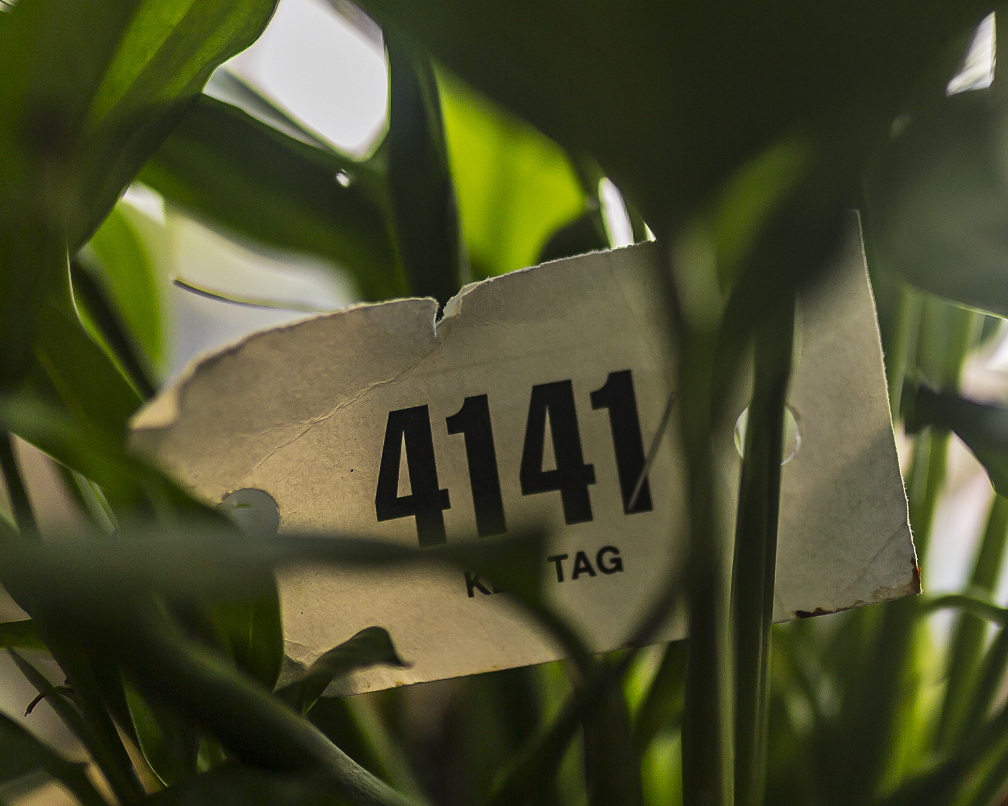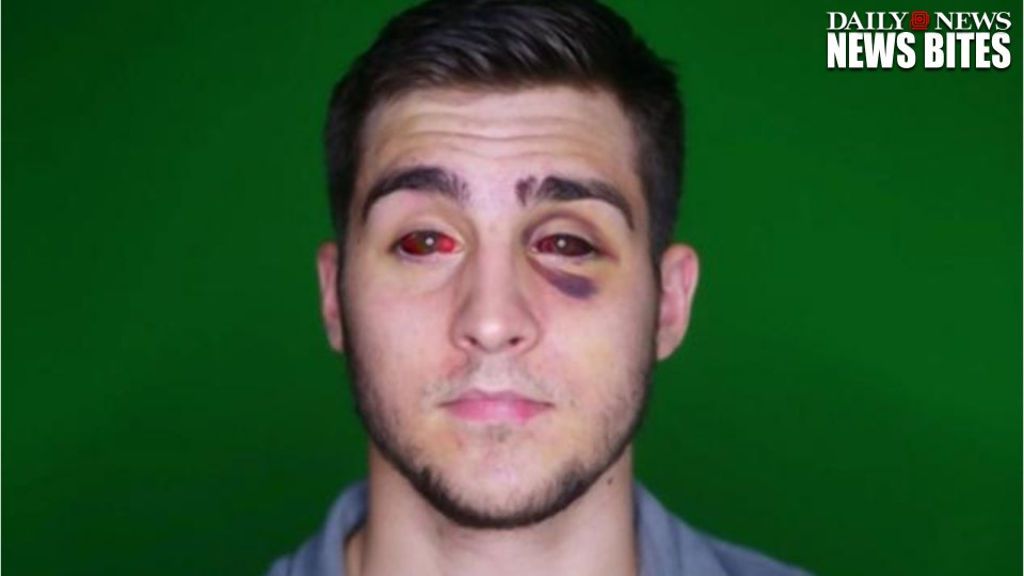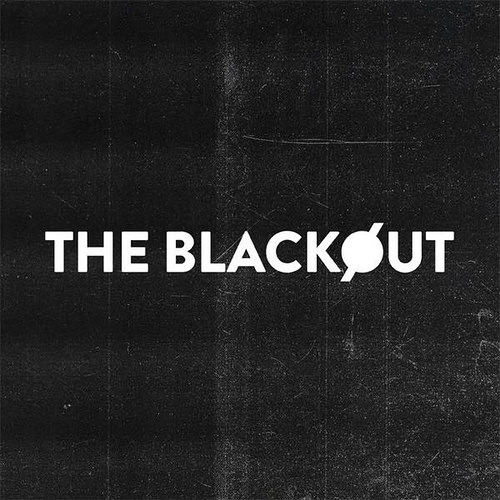“Fight me? When I’ve already won?”
It seemed to me, as I sat there in bed, staring at the wall, at the sunlight coming in at the window, at Maxim’s empty bed, that there was nothing quite so shaming, so degrading as a marriage that had failed. Failed after three months, as mine had done.
For I had no illusions left now, I no longer made any effort to pretend. Last night had shown me too well. My marriage was a failure. All the things that people would say about it if they knew, were true. We did not get on. We were not companions. We were not suited to one another.
I was too young for Maxim, too inexperienced, and, more important still, I was not of his world. The fact that I loved him in a sick, hurt, desperate way, like a child or a dog, did not matter. It was not the sort of love he needed. He wanted something else that I could not give him, something he had had before.

So I decided to have a seance, she does not continue. That’s the second Mrs. de Winter, the narrator of Daphne du Maurier’s 1938 novel, Rebecca, a best-selling book that for some reason doesn’t include even a single member of the living dead. A quick search for the word seance: no results. Tarot: no results. Potion, parallel dimension, vampire: nothing. You wouldn’t think it was possible to write a story without any of those words, but apparently it can be done.
But it’s a spooky contraption, this officially unhaunted Rebecca. We never find out the name of the main character — they always refer to “Mrs. de Winter,” or “Maxim’s new bride” — but I expect her name is probably Victoria. It usually is in stories like this, and I think “Victoria de Winter” has kind of a ring to it, don’t you?
Vicki is a naive young orphan type who works as the paid companion of a rich woman, who, if they’d ever followed through on this plotline, would probably turn out to be her mother. While her employer is visiting Monte Carlo, Vicki strikes up an acquaintance with Maxim de Winter, a fabulously wealthy widower, and it turns out that Maxim and Vicki have a lot in common, go figure. After two weeks, they’re married, and Vicki is whisked off to a mansion in Cornwall, where things go awry.
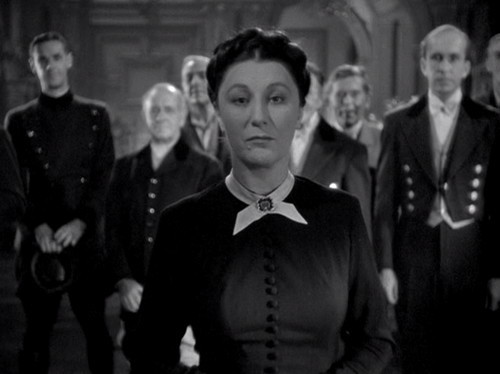
At Manderley, Vicki’s dreams of becoming an adored lady of the manor crumble quickly into self-consciousness and doubt. It’s so big, and Maxim gets swallowed up into business, and she’s left alone in an enormous house that doesn’t feel like hers. She’s intimidated by the staff, especially the terrifying housekeeper, Mrs. Danvers.
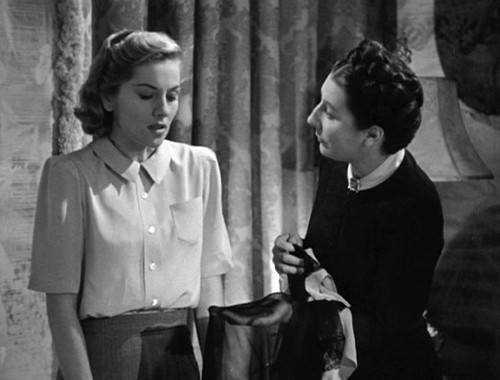
Rebecca, the first Mrs. de Winter, died a year ago, not at a seance, and the staff has spent the last year running the house the way that Rebecca wanted them to. It’s still Rebecca’s house, really, and Vicki feels like an interloper.
Mrs. Danvers — who doesn’t have a first name, so I assume it’s Julia — is pretty much the embodiment of Team Rebecca. Every time Vicki tries to make a decision, Danvers tells her how Rebecca used to do things, and Vicki feels obliged to go along with it. Danvers takes Vicki to Rebecca’s old room — which is enormous, and faces the sea, and is filled with all of Rebecca’s clothes and secrets and accoutrements, and as far as we know there isn’t an unpredictable space-time fissure that allows vampires from a parallel dimension to sneak through and start telling people they’re a descendant of someone.
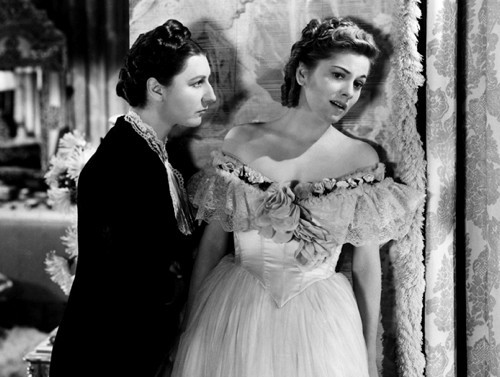
Things get worse, and the final straw is the fancy dress ball, where Vicki is tricked into wearing a costume that it turns out Rebecca wore at the last ball. Maxim is furious, and Vicki feels lost and humiliated, and Mrs. Danvers tries to talk Vicki into jumping out a window. Then the book unexpectedly turns into a murder mystery, and there’s blackmail and an inquest and the house burns down and they all live happily ever after. So that’s Rebecca.
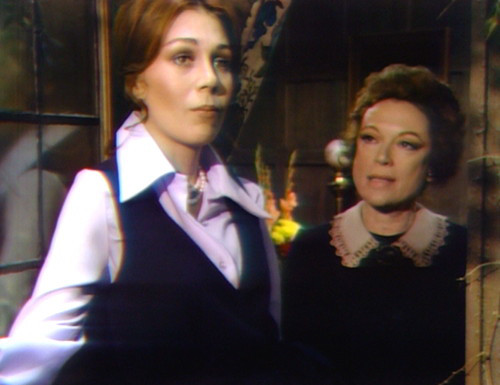
In 1940, Alfred Hitchcock directed a film adaptation of Rebecca, which won Best Picture, and then in 1970, it was adapted into an afternoon television series about vampires and voodoo dolls, where Rebecca is an undead succubus who reads tarot cards and eats lawyers. This is just about the silliest adaptation of Rebecca that you could do in 1970, besides making it into an episode of Sesame Street. You wouldn’t think it was possible.
Now, unlike Charlotte Brontë and Bram Stoker and H.P. Lovecraft and all the rest, Daphne du Maurier actually lived long enough to be around when Dark Shadows was stealing her story. Du Maurier lived until 1989, so presumably somebody could have mentioned it to her. I don’t know if anyone ever did; I imagine it would be hard to bring up in conversation. Where would you even start?
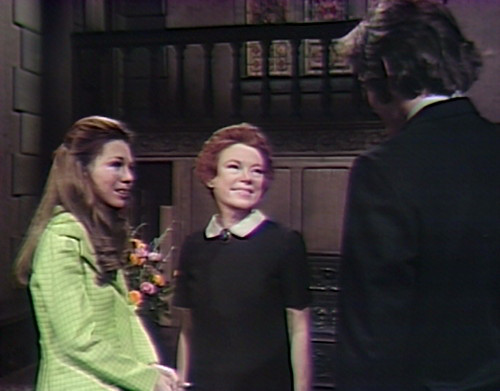
It’s taken a while for the Rebeccaness to really kick in, thanks to the odd circumstances of Dark Shadows production this year. Half of the show’s cast needed to ankle up to Tarrytown for six weeks to make House of Dark Shadows, so the writers decided to trap Barnabas in a parallel dimension, where they could spin a temporary tale featuring the remaining players.
This was a weird decision to make in the first place, but it’s even weirder that they chose Rebecca as the basis for the storyline, because pretty much the first thing that they did was to send the two main characters of Rebecca upstate, and then muddle along with a handful of secondary characters.
In fact, the Dark Shadows storyline is kind of the photo negative of the book. In the novel, the first act is Vicki falling in love with Maxim in Monte Carlo, and it ends with his surprise proposal and their hasty marriage. Then act 2 is pretty much Vicki and Mrs. Danvers knocking around an empty house, until the costume party and the act 3 murder mystery.
In Dark Shadows, we come in after act 1 is already over, with Quentin and Maggie showing up at Collinwood already hitched. And instead of focusing act 2 on housekeeper Hoffman tormenting Maggie, both characters are bundled off-screen, and we end up with Maxim and Rebecca’s twin sister killing time by opening graves and having seances, and wondering when the characters from Rebecca are going to come back.
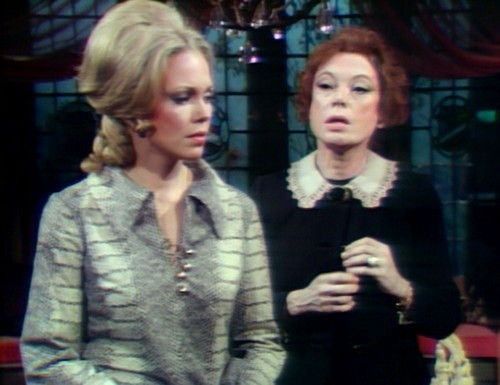
But the craziest thing about the Dark Shadows version of Rebecca is that they actually have Rebecca in it. The entire point of Rebecca is that Rebecca isn’t there.
Here’s Vicki, reflecting on the power of her unseen antagonist:
Perhaps I haunted her as she haunted me; she looked down on me from the gallery as Mrs. Danvers had said, she sat beside me when I wrote my letters at her desk. That mackintosh I wore, that handkerchief I used. They were hers. Perhaps she knew and had seen me take them. Jasper had been her dog, and he ran at my heels now. The roses were hers and I cut them. Did she resent me and fear me as I resented her? Did she want Maxim alone in the house again? I could fight the living but I could not fight the dead.
If there was some woman in London that Maxim loved, someone he wrote to, visited, dined with, slept with, I could fight her. We would stand on common ground. I should not be afraid. Anger and jealousy were things that could be conquered. One day the woman would grow old or tired or different, and Maxim would not love her anymore. But Rebecca would never grow old. Rebecca would always be the same. And her I could not fight. She was too strong for me.
And to add another weird wrinkle, it’s Angelique — the Dark Shadows Rebecca — who has that moment, reflecting on the second wife.
“She’s all he thinks about!” she says, talking to her eccentric gypsy aunt. “And as long as that’s true, I haven’t any hope of winning him back! As long as she’s in New York, I can’t fight her! I want her here, where I can deal with her!” And then she casts a bunch of magic spells.
The idea of doing an adaptation of Rebecca where Rebecca comes back from the dead is ridiculous. It’s Dickens without poor people, which can’t be done, except Dark Shadows did it last year anyway. It’s like a production of Waiting for Godot where Godot shows up halfway through, and Vladimir and Estragon spend the rest of the play talking about how surprised they are.
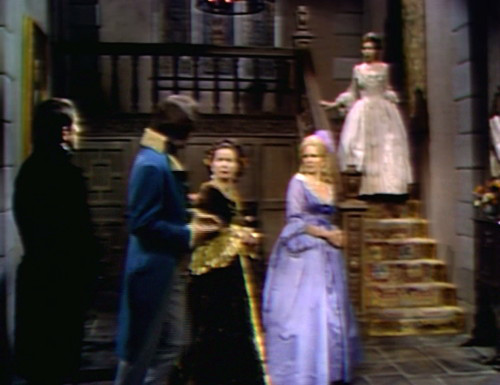
And yet here we are, two months later, at the costume party. Maggie and the crazy housekeeper have returned to the story, and this week, we suddenly swerve, merging back into Manderley traffic.
There’s a grand costume ball, represented here by five people, and Maggie’s been tricked into wearing the same outfit that Angelique wore last year. Quentin is furious, smashing a glass and running out of the house, presumably heading for some parallel Collinsport bar that’s willing to serve people dressed as Lieutenant Forbes.
That’s not quite how the scene goes in the book — Vicki just changes her outfit and joins the party again, and she and Maxim go through the motions of greeting their guests without speaking to each other. But it’s the same thing, a moment of humiliation and self-doubt that sets up the big window sequence.
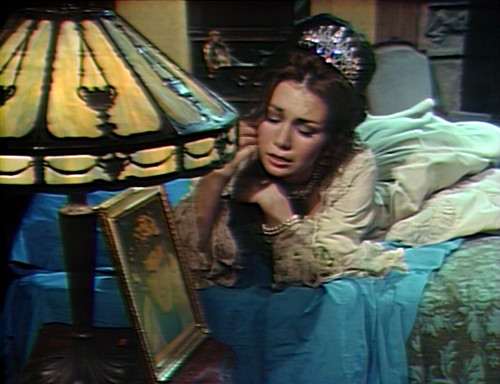
Maggie coming down the stairs for the costume party was the end of Thursday’s episode, and they’re saving the big moment for the end of today’s, so they fill up the intervening twenty-two minutes with nostalgia and cruelty, which is exactly what we need.
I’ve been talking all week about the Dark Shadows quality improvement program, which I’m attributing to exec producer Dan Curtis coming back to New York after shooting HODS. The show has been drifting for a couple months, filling up time with meaningless story tangles that didn’t accomplish anything. But this week, suddenly there’s some fresh energy — characters are leaving their storyline silos and getting into each other’s business, and the dialogue is sharper.
For a while now, it’s been hard to tell the writers apart — Sam Hall, who’s usually the wittiest member of the writing team, has fallen into a post-House funk, writing functional dialogue and apparently not really caring that much. But today’s episode takes him right back up to form.
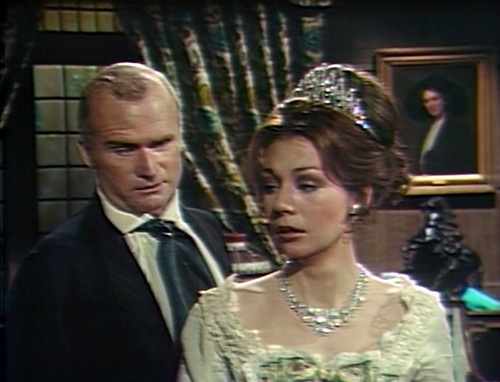
And it’s Roger, of course, who brings entertainment back into our lives. The episode starts with Maggie and Roger in the bleak aftermath of the costume ball, still dressed up as other people.
“Waiting up for Quentin?” he sneers. “I wouldn’t, if I were you.” He makes his way to the drinks table. “Well, frankly, the party would have been a disaster, even if the host had been here. Not like last year.” He muses. “Ah, last year, there was joy in the house, and laughter in the rooms — genuine laughter, not the forced uncomfortable sounds we heard tonight.”
Maggie doesn’t respond; she just gets up and walks to the door.
“I would take that dress off, if I were you,” he says, helpfully. “It doesn’t suit you. But you know that now, don’t you? You must have learned a lesson.” As Maggie stalks away, he calls after her, “No one takes Angelique’s place! You know that! No one!” And then he laughs and laughs, and that’s the first scene of the day.
And it’s lovely. No supernatural shocks, no magic potions — just a man being cruel to his sister in law, in a world where the word “gauche” is a cutting blow.
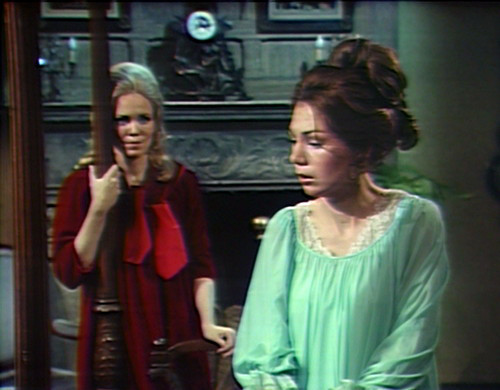
The whole episode is like that — just Roger, Angelique and Hoffman gossiping and teasing Maggie in every scene, pretending to be sympathetic and hoping she falls out a window.
Angelique spends some time acting like Maggie’s friend — “I’m sure no one had any idea that there was anything wrong, it was very clever of you to say that Quentin had just suddenly taken ill!” — but she keeps coming back to the theme of how badly Quentin’s been acting, pressing the point that maybe they aren’t that suited for each other.
“What am I going to do when he comes back?” Maggie asks, and Rebecca answers, “You’ll know what to do, because you love him, and because you want to make his life happier, and simpler, than it is now.”
It’s not particularly decorative dialogue, but for the first time in a while, it has a soupcon of subtext. Think of Sabrina, yelling at Cyrus, “There is a evil here! I can feel it still! There is a terrifying evil here!” and then listen to today’s episode. That was only a month ago.
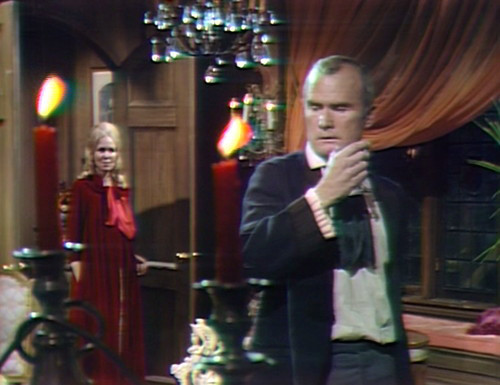
And it’s not just the writing; they’re also putting more care into the directing, and not just for the special effects. There’s a shot in today’s episode that might as well be from House of Dark Shadows, shooting through some candles in the foreground. Again, not brilliant, but it’s been a little while since the directors cared enough to set up a shot like that.
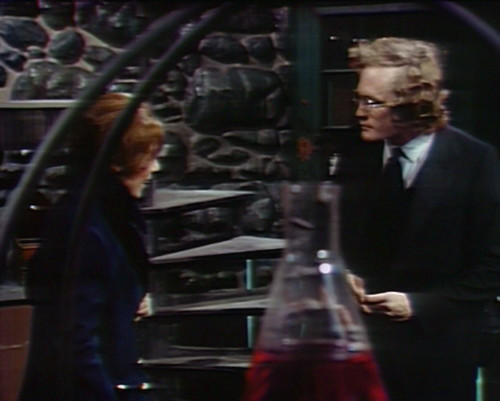
That’s not the only example from this week. On Wednesday, there was a nice shot of Maggie and Cyrus, with Cyrus’ Jekyll and Hyde potion intruding between them…
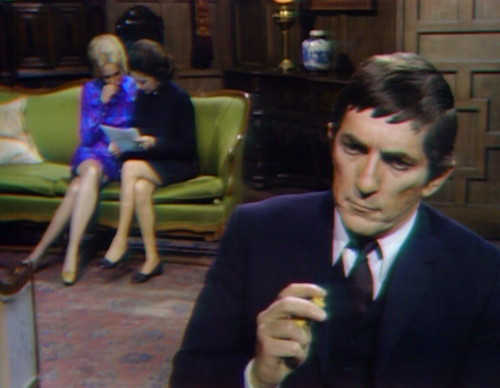
And this little scene-ending shot from yesterday, Barnabas thoughtfully playing with a chess piece as Angelique makes plans over his shoulder. Dan is back, clearly, and determined to keep plussing the show wherever they can.
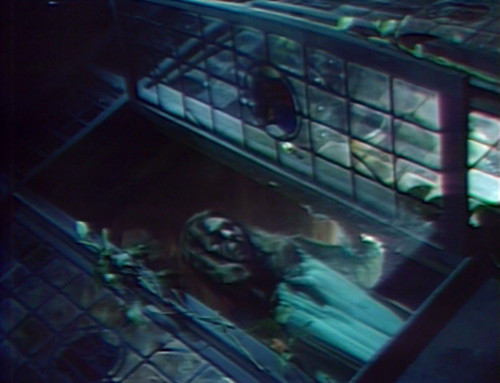
And then there’s the window.
Mrs. Danvers pushed me towards the open window. I could see the terrace below me gray and indistinct in the white wall of fog. “Look down there,” she said. “It’s easy, isn’t it? Why don’t you jump? It wouldn’t hurt, not to break your neck. It’s a quick, kind way. It’s not like drowning. Why don’t you try it? Why don’t you go?”
The fog filled the open window, damp and clammy, it stung my eyes, it clung to my nostrils. I held onto the windowsill with my hands.
“Don’t be afraid,” said Mrs. Danvers. “I won’t push you. I won’t stand by you. You can jump of your own accord. What’s the use of your staying here at Manderley? You’re not happy. Mr. de Winter doesn’t love you. There’s not much for you to live for, is there? Why don’t you jump now and have done with it? Then you won’t be unhappy anymore.”
I could see the flower tubs on the terrace and the blue of the hydrangeas clumped and solid. The paved stones were smooth and gray. They were not jagged and uneven. It was the fog that made them look so far away. They were not far really, the window was not so very high.
“Why don’t you jump?” whispered Mrs. Danvers. “Why don’t you try?”
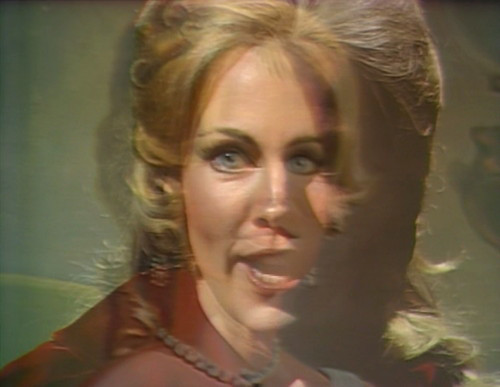
That’s not how they do it on Dark Shadows, of course; it doesn’t have enough Chromakey. Instead of the housekeeper, they just go right ahead and let Rebecca take over, talking smack from beyond the grave.
So this story is based on Rebecca, in the same spirit as Muppet Treasure Island is based on Treasure Island — you can recognize most of the plot points, but it’s a musical and the grizzled old castaway is played by Miss Piggy.
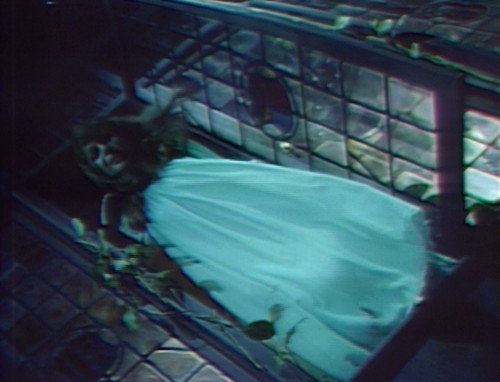
Here’s one final quote from Rebecca, which suggests that history doesn’t always move in a straight line:
“Mrs. Danvers,” I said. “Mrs. Danvers.” She turned to look at me, and I saw her eyes were red and swollen with crying, even as mine were, and there were dark shadows in her white face.
Yeah, I bet there were. And that’s where we leave Maggie at the end of this tumultuous week: lost in time, trying her best, and teetering, as usual, between the ridiculous and the sublime.
Monday: The Seventh Level of Witchcraft.
Dark Shadows bloopers to watch out for:
At the start of act 1, when Maggie turns the lamp on, there’s a squeak, and somebody in the studio whispers, “Watch your back!”
Angelique trips over the sentence, “He really didn’t have any right to run over — run out of the party like that.”
When Roger gets up from the window seat, a boom mic is visible.
Hoffman tells Angelique, “He will begin to be finished with her.”
Monday: The Seventh Level of Witchcraft.
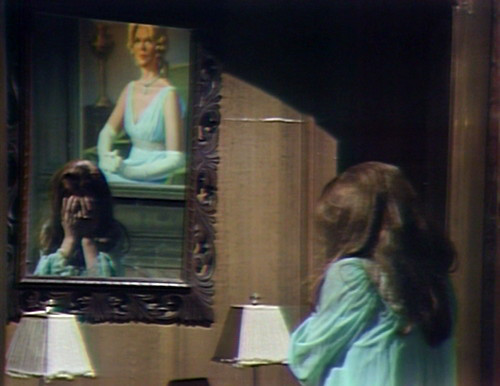
Dark Shadows episode guide
— Danny Horn
Share this:

